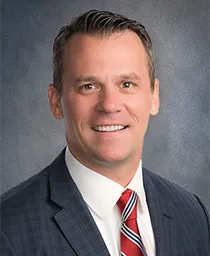Originally published in the St. Louis Business Journal on October 20, 2025
In nearly every client or prospect meeting over the past 12 to 18 months, one topic consistently surfaces: artificial intelligence. Companies of all sizes are exploring how to best leverage AI within their organizations. From enhancing front-office operations to streamlining back-office functions, AI presents significant opportunities for innovation and efficiency. Most businesses are wisely starting small, ensuring that human oversight remains in place as they explore AI’s capabilities.
Here are several key ways businesses are taking advantage of AI:
- Operational Efficiency & Automation: AI is helping organizations automate repetitive tasks such as data entry, invoice processing, and email drafting, freeing employees to focus on strategic, high-value work and dramatically improving productivity.
- Enhanced Decision-Making: By analyzing vast amounts of data, AI can identify patterns and trends that improve forecasting, risk assessment, and strategic planning.
- Cost Reduction: AI reduces operational costs by predicting maintenance needs, optimizing energy usage, and streamlining supply chain efficiency.
- Innovation Acceleration: Companies are using AI to generate ideas, speed up product development, and create more dynamic marketing and design strategies.
- Risk Management & Compliance: AI improves risk detection by identifying fraud, supporting regulatory compliance, and minimizing human error in critical processes.
- Talent Development & Work-Life Balance: AI contributes to workforce development by identifying skills gaps, enabling personalized training, and reducing employee burnout through task automation.
I sat down with Marc Ashworth, Chief Information Security Officer at First Bank, to discuss how organizations can better safeguard their information. He offered critical insights into how cybersecurity teams can proactively defend against evolving threats.
While AI offers many benefits, it also introduces complex risks, such as data leakage, intellectual property loss, model bias, misinformation, and privacy violations. For example, AI tools trained on sensitive data may inadvertently expose confidential information. Generative models can produce inaccurate or misleading content, which could impact financial decisions or damage customer trust. Additionally, biased algorithms may contribute to unfair lending practices or discriminatory outcomes.
Cybersecurity teams are under pressure to implement effective controls, training, and monitoring to safeguard their organizations. Techniques used just two years ago to restrict access to AI tools are now outdated and overly burdensome. Instead, the focus must shift toward protecting the data itself.
Meanwhile, developers and IT professionals are turning to AI to generate code, automate workflows, and improve application scalability and efficiency. Unfortunately, cybercriminals are also leveraging AI to craft sophisticated malware, ransomware, and phishing emails that are nearly indistinguishable from legitimate messages. The era of poorly written scams is over. AI makes attacks faster, smarter, and far more convincing.
As family-owned and privately held businesses explore the possibilities of AI and other emerging technologies, they’re also navigating the broader complexities of innovation, from adapting operations to managing new types of risk. At First Bank, we’ve walked in your shoes. As a fourth-generation family-owned business, we bring a unique perspective to helping companies evolve while staying true to their values. Our team offers the insights and guidance to help you make informed decisions, adapt with confidence, and position your business for long-term success in an ever-changing landscape. To learn how First Bank’s Commercial Banking team can support your business, visit first.bank/CommercialBanking.

Brad Mauzy
Senior Vice President – Relationship Manager
Commercial Banking
[email protected]
Brad has been in Finance and Banking since 2006 and been in Commercial Banking for the past 15 years. He holds an MBA from Webster University and a Bachelor of Science from University of Missouri – Columbia. Brad is active in the community and sits on the board of STL Youth Jobs.


